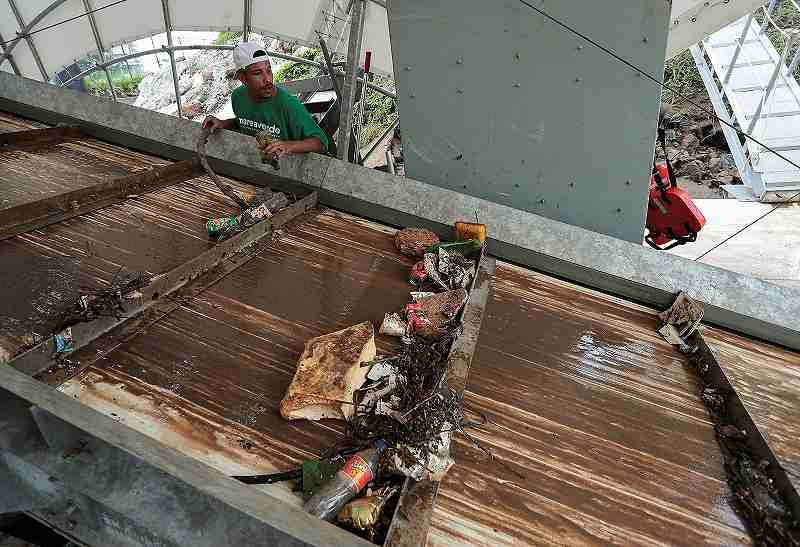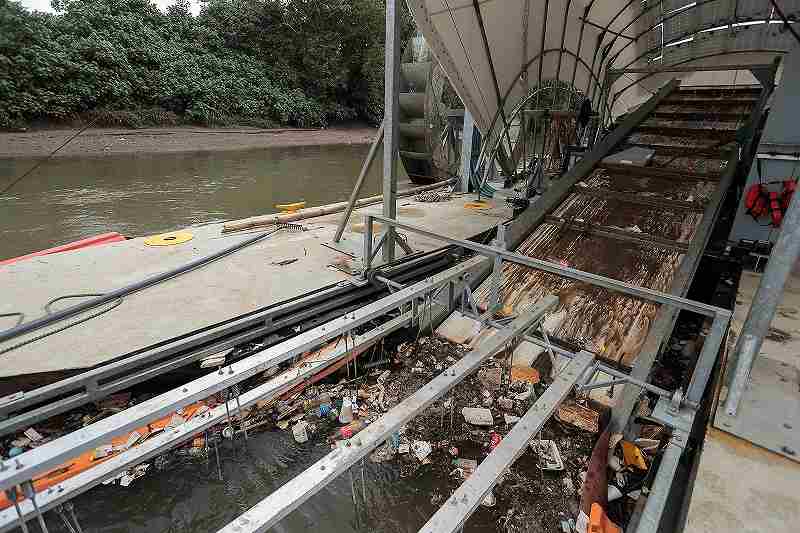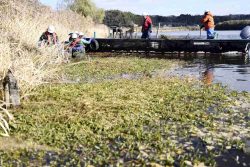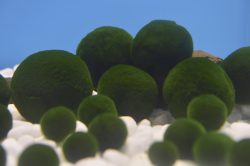
A worker looks at garbage on a conveyor belt of the self-sustainable water wheel, called Wanda Diaz and installed by NGO Marea Verde, in Panama City on Oct. 21.
15:49 JST, November 16, 2022
PANAMA CITY (Reuters) — Latin America’s first renewable-powered, trash-trapping wheel whisks away garbage floating down one of Panama’s most important but heavily polluted rivers before it spills into the Pacific Ocean, thanks to an initiative by a local environmental group.
The wheel, fueled by hydraulic and solar energy, collects the vast amounts of waste produced in the capital Panama City with its metro population of around 2 million people. Tons of trash often flow into the sea each year.

A conveyor belt picks up garbage.
“Cleaning beaches is good, but it is more effective and cheaper to trap garbage in rivers because when it reaches the ocean, the environmental and economic cost becomes too high,” said project leader Robert Getman.
Installed by environmental group Marea Verde, the wheel is named Wanda Diaz, in part a reference to the Juan Diaz river where it spins.
Wanda Diaz launched in late September in a river basin since drenched by heavy rains, which in turn propelled plastic bottles and containers into Wanda’s mechanical arms.
By mid-October, Wanda had collected 22 1.3-cubic meter bags of plastic bottles.
The Juan Diaz river is one of the most polluted in the country due to poor waste management, little regulation of real estate development, and its course across Panama City, one of Central America’s largest cities.
The waterway is nevertheless home to lizards, turtles and birds that live in its mangroves.
Over five years, Marea Verde projects have slowed the spread of trash across Panama’s rivers and coastlines.
Before the coronavirus pandemic struck, the group rolled out its “Barrier or Trash” technology, a floating device that trapped over 100 tons of waste in the Matias Hernandez river from 2019 to 2020.
Wanda, inspired and supported by the Baltimore Bay “Trashwheel” in the United States, is fitted with artificial intelligence cameras to categorize different plastics.
“We want to raise awareness that we can prevent the death of this very important river,” said Marea Verde head Sandy Watemberg, expressing optimism that the wheel will help.
But she also pointed to the need for those who much too casually use single-use plastics to rethink their own consumption.
“The most important thing is to achieve a change in habits,” she said.
Top Articles in Science & Nature
-

Japan Institute to Use Domestic Commercial Optical Lattice Clock to Set Japan Standard Time
-

Japan to Face Shortfall of 3.39 Million Workers in AI, Robotics in 2040; Clerical Workers Seen to Be in Surplus
-

Record 700 Startups to Gather at SusHi Tech Tokyo in April; Event Will Center on Themes Like Artificial Intelligence and Robotics
-

iPS Treatments Pass Key Milestone, but Broader Applications Far from Guaranteed
-

iPS Cell Products for Parkinson’s, Heart Disease OK’d for Commercialization by Japan Health Ministry Panel
JN ACCESS RANKING
-

Japan PM Takaichi’s Cabinet Resigns en Masse
-

Japan Institute to Use Domestic Commercial Optical Lattice Clock to Set Japan Standard Time
-

Israeli Ambassador to Japan Speaks about Japan’s Role in the Reconstruction of Gaza
-

Man Infected with Measles Reportedly Dined at Restaurant in Tokyo Station
-

Videos Plagiarized, Reposted with False Subtitles Claiming ‘Ryukyu Belongs to China’; Anti-China False Information Also Posted in Japan






















